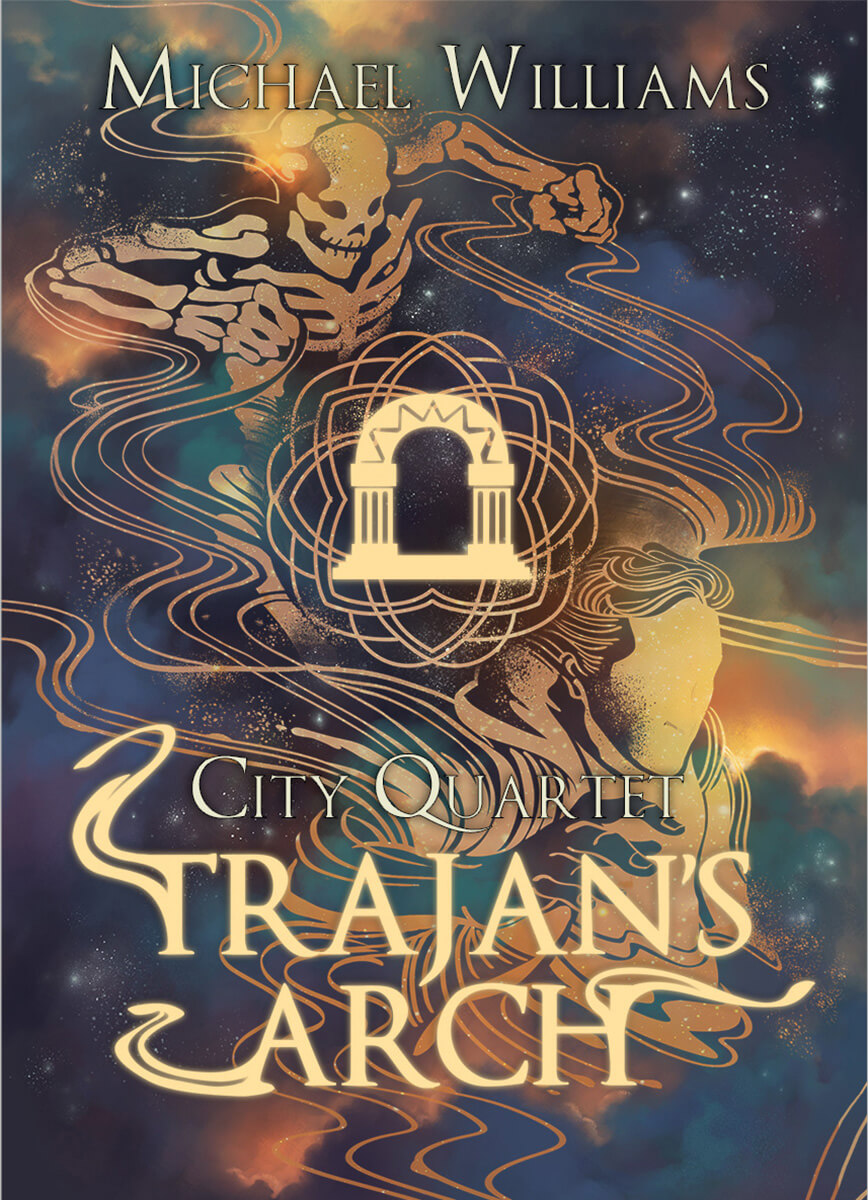
Trajan’s Arch is my first book by Michael Williams and it was quite an interesting read. It is a tribute to the Lord of the Rings as well as what it takes to be a writer. Filled with beautiful prose and haunting ideas that will not leave you for a long time, Trajan’s Arch is a masterpiece. I got the opportunity to read and review the book as part of Michael Williams’ blog tour. What’s even better is the chance to get to know more from him about the story and writing.
Michael Williams was born in Louisville, Kentucky, and spent much of his childhood in the south central part of the state, the red-dirt gothic home of Appalachian foothills and stories of Confederate guerrillas. Through good luck and a roundabout journey he made his way through through New England, New York, Wisconsin, Britain and Ireland, and has ended up less than thirty miles from where he began. He has a Ph.D. in Humanities, and teaches at the University of Louisville, where he focuses on the Modern Fantastic in fiction and film.
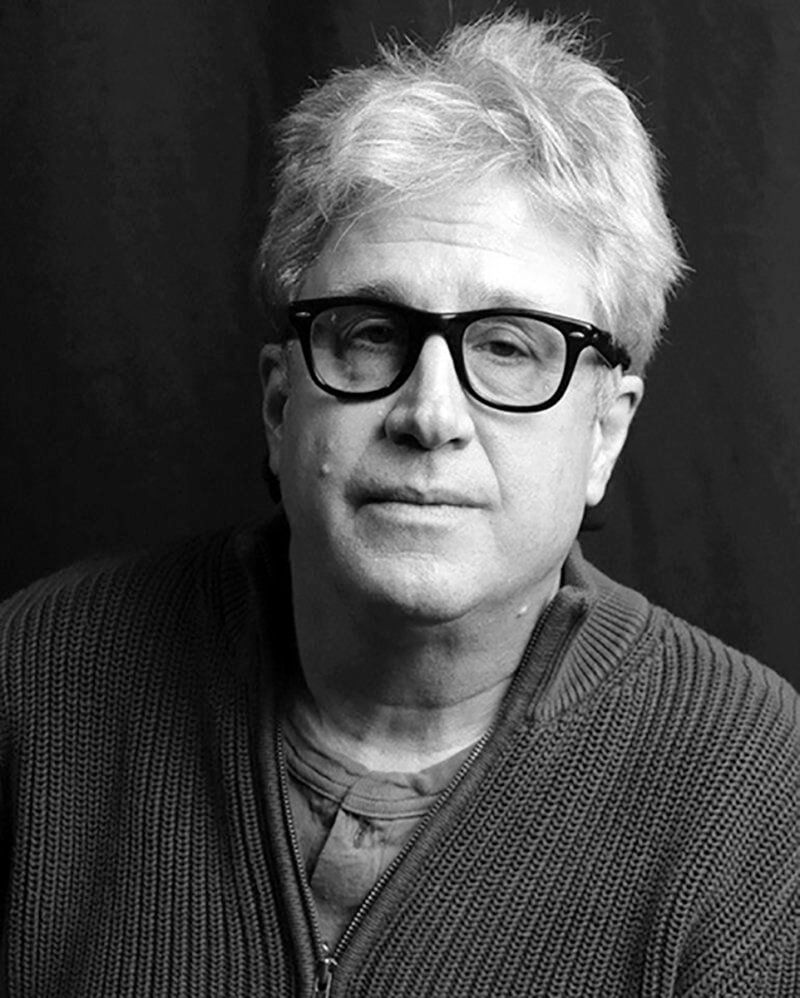
Over the past 25 years, Michael has written a number of strange novels, from the early Weasel’s Luck and Galen Beknighted in the best-selling DRAGONLANCE series to the more recent lyrical and experimental Arcady, singled out for praise by Locus and Asimov’s magazines. In Trajan’s Arch, his eleventh novel, stories fold into stories and a boy grows up with ghostly mentors, and the recently published Vine mingles Greek tragedy and urban legend, as a local dramatic production in a small city goes humorously, then horrifically, awry. Trajan’s Arch and Vine are two of the books in Williams’s highly anticipated City Quartet, to be joined in 2018 by Dominic’s Ghosts and Tattered Men.
Now that you have some background him, let’s dive into the interview!
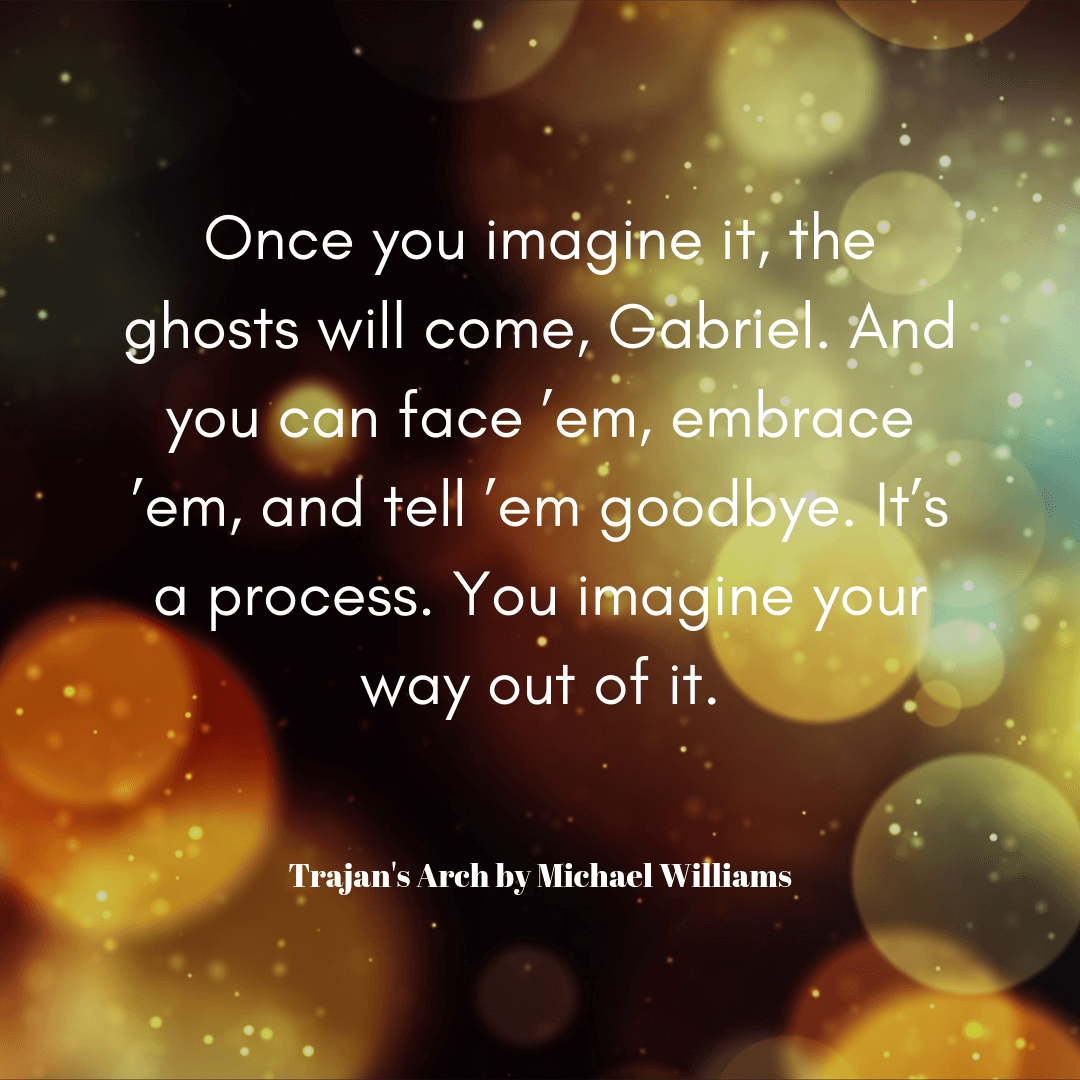
My curiosity about Trajan’s Arch
- Trajan ends up being a huge influence in Gabriel’s life, yet they only interact a handful of times. It was almost like sometimes we meet people and though we only know them for a short period of time, they stay with us forever. What was your reasoning behind making Trajan this person for Gabriel?
Some of our most profound influences come from intensity rather than duration. Gabriel takes years to come to terms with that knowledge, and Trajan holds sway in his memory through recall and dream, through the stories that Trajan wrote that are interspersed through the novel, and through a number of less direct contacts that the novel and Gabriel himself gloss over. You can see them take shape in the conversations between Gabriel and Jasmine, then between Gabriel and Joey, and in moments the novel only brushes against, like the events surrounding Gabriel’s winter trip downtown to the movies. It’s one of the ways that the past shapes us, even when we don’t recall the shaping directly. The novel dwells in that truth, and judging from your excellent question, you get that entirely.
- Gabriel’s tarot card reading reveals the card of Death which means “the change of old concepts for new, the change from the personal to the universal”. How does this Gabriel evolve in this story, keeping that reading in mind?
Dylan Thomas had a book of poems called Deaths and Entrances, and the title always stuck with me. Each death we have is followed by an awakening, and maybe if we are prepared, we see the new prospects and embrace them. I think it’s a principle in the way we live our lives, and Gabriel is no exception, dying to one way of seeing the world and being born to the next. Each time, though, his vision widens, and by the end of the book he faces a change that is so large that it was hard to imagine, much less to put words around. I leave it to the reader to judge how dear Gabriel stands up at that transforming moment.
- How is Trajan’s Arch different or similar to other books that you have written?
Trajan’s Arch marked a passage for me as well, out of novels that can be more easily recognized as fantasy to the kind of book I would characterize as magical realism, or more accurately, “mythical realism”—stories firmly anchored in the stuff of our daily experience, but infused and undergirded with the world of myth, a world that travels beside, beneath, and above our own and very often intertwines with what we already know. A British friend of mine, a smart reader, said that it was interesting to see my work as a realistic novelist. I think she meant it as a compliment. At least I hope so. But at any rate, Trajan’s Arch is the first of my books to recognize that the stuff of myth lies in the things already around us, that we are mythmakers in the very act of paying attention.
- Your prose is vivid and thoughtful, conjuring images in the mind. What are some works or writing exercises that helped you develop such imagery using words?
Well, thank you. I suppose the best textures of my prose come from all the poetry I’ve read, that the glamor and music of words was my first love, and that to this day I still consider poetry the highest of arts, which my prose only occasionally and fitfully approximates.
- What significance do ghosts play in Gabriel’s life?
I’ve characterized Trajan’s Arch before as “a coming of age story with ghosts,” and ghosts play a number of roles in the novel: I think you pretty much nailed it in your review of the book. Some of the ghosts are literal visitants, haunting the landscape of Gabriel’s childhood and his growing up; some of them are the people he knows, who haunt his memory and his attempt to understand. Our mental landscapes are peopled with spirits, and they ask different things of us as we grow, change, and come into who we are.
- Is your writing process similar to Gabriel’s?
Oh, my, I hope not. He has one of the longest dry spells in history! I think the reason I’ve yet to die of writer’s block is that, no matter how slowly I work, I work to a regular, mundane schedule, in which protracted labor finally gives birth.
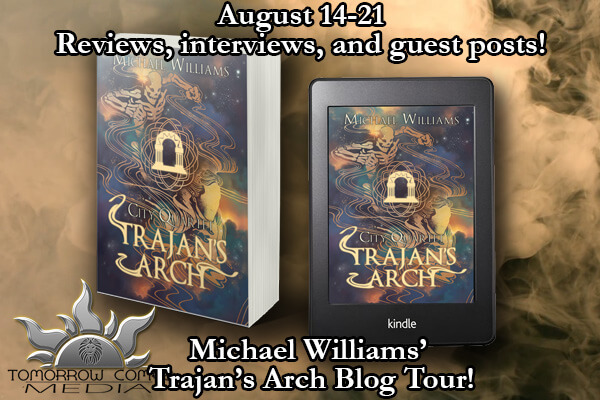
My curiosity about Michael Williams’ writing routine and more
- Some people take a notebook or notepad with them wherever they go, in case of a sudden flash of inspiration hits them. Are you one of them?
Sometimes. And sometimes a little pocket recorder. Sometimes neither, though, and those occasions almost always lead to regret, because the inspiration fades unheeded and unused. But then, most of the time, it wasn’t inspiration if you forget it. Or so I tell myself.
- How do you select the names of your characters? Are they just names that appeal to you, did you look them up for a special meaning?
They occur to me. Often after I’ve heard the character speak, I know what name he or she answers to. It’s usually intuitive, and I don’t question the rightness of the choice, but more what the choice tells me—the implications and associations of the name. One of the reviewers of Gabriel’s novel mentions how apocalyptic his name is, and to be honest, that hadn’t occurred to me until the moment I was writing the scene. The name “Trajan Bell” appealed because it was classical, gothic, and lonely. My whole process of naming is poetic, subjective.
- Do you hide any secrets in your books that only readers will find?
Yes. As you read the books in my City Quartet, of which Trajan’s Arch is one, you’ll discover different secrets depending upon which volume is your point of entry. The second book you read in the quartet will answer small questions about the first one you read (and you can take them up in any order!), and characters in one book will make cameo appearances in another. The more of the books you read, the more of the jokes you’ll be in on.
- What would you tell your younger self when it comes to writing?
Don’t forget that you’re doing this for the love of the process. Money and celebrity will probably not come from what you are doing, but you gather joy in creation, in making up characters and story lines and in the exhilarating and jubilant play of words. Have fun while you do it, and don’t let regret or anticipation spoil the party. I wish I could have told myself that.
Trajan’s Arch is now available in stores. My thoughts on it can be found here. 🙂
Amazon Print Amazon Kindle
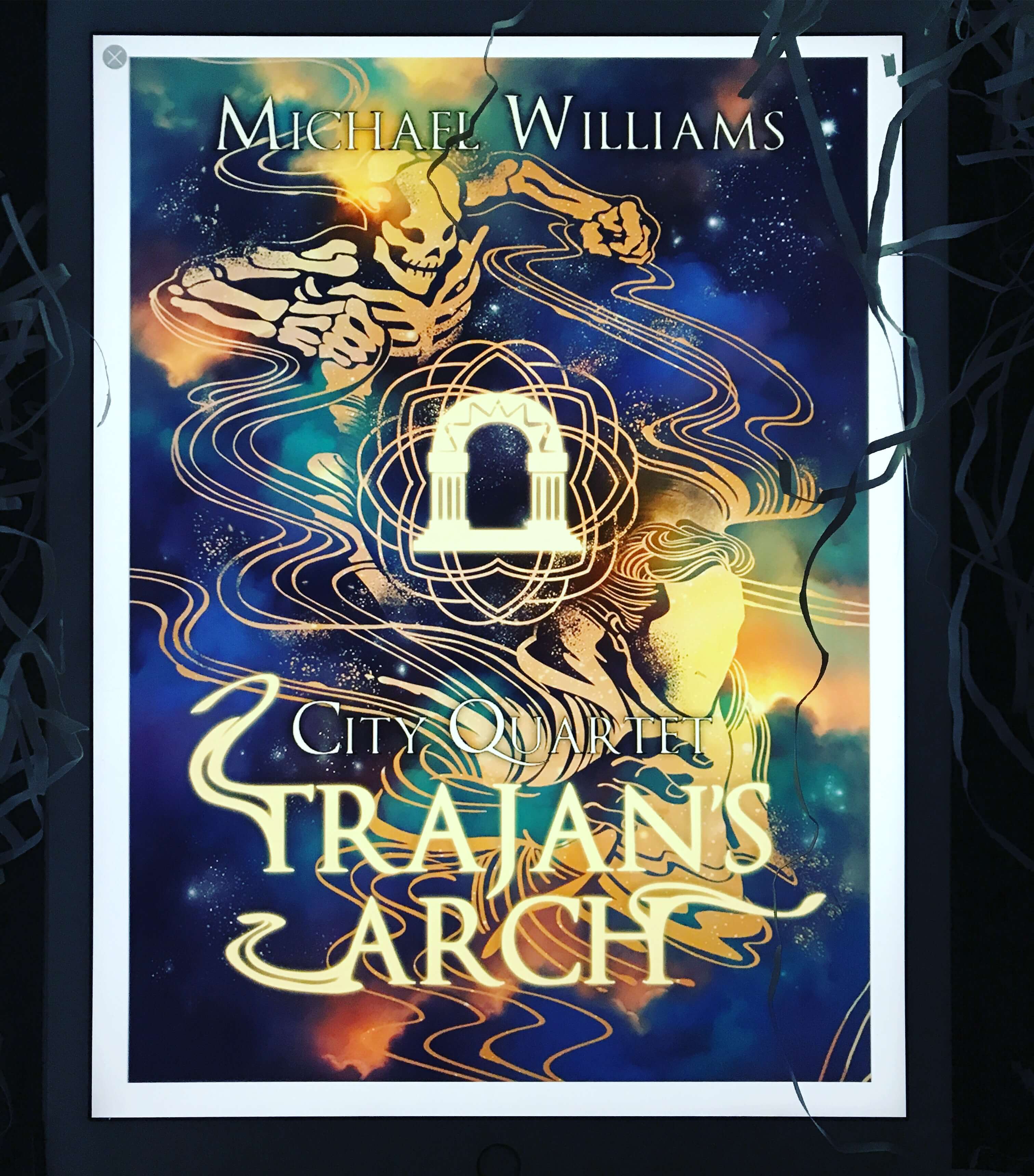
Cover image: Photo by Yeshi Kangrang on Unsplash

Great questions, and intriguing answers. Or is it the other way around? Hmmmm….
Thank you! 💜
Thanks for a smart interview and a thoughtful review, Kriti! It was a wonderful way to begin this blog tour.
It was my pleasure, Michael. I learned so much!